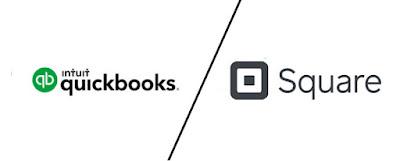Are you a business owner looking for the perfect financial management solution? Well, look no further because today we are going to dive into the ultimate showdown between QuickBooks and Square. These two powerhouse platforms have revolutionized how businesses handle their finances, but which one is truly the best fit for your business? In this comprehensive guide, we will break down everything you need to know about QuickBooks vs Square. From their features and benefits to their drawbacks and limitations, we'll leave no stone unturned. So grab a cup of coffee and let's get ready to find out which tool will take your business to new heights!

Comparison QuickBooks vs Square
When it comes to comparing QuickBooks vs Square, there are a few key factors that business owners should consider.
Let's talk about the purpose of each platform. QuickBooks is primarily a robust accounting software that offers a wide range of features for managing finances, such as invoicing, expense tracking, and payroll management. On the other hand, Square started out as a payment processing system but has since expanded its offerings to include features like point-of-sale (POS) systems and inventory management.
In terms of user-friendliness, both platforms have their strengths. QuickBooks provides comprehensive accounting tools with an intuitive interface that makes it easy to navigate through various financial tasks. Square, on the other hand, boasts simplicity and ease-of-use in its design which can be great for small businesses or those new to financial management.
Another important consideration is pricing structure. QuickBooks offers different plans tailored to different business needs with varying price points. This allows you to choose the plan that aligns best with your budget and desired features. Square takes a different approach by charging transaction fees based on sales volume rather than offering subscription-based pricing.
Integration capabilities are also worth mentioning when comparing these two platforms. QuickBooks integrates seamlessly with other popular business tools such as CRM systems or e-commerce platforms which can streamline workflows and save time on data entry. While Square does offer integrations options too, they may not be as extensive compared to QuickBooks.
Customer support is crucial for any software solution you invest in for your business. With QuickBooks' long-standing reputation in the industry comes reliable customer support via phone or live chat assistance whenever you encounter issues or have questions regarding their software functionality.
Square also provides customer support but some users report difficulties reaching them at times due to limited availability.
As we delve deeper into this ultimate comparison between QuickBooks vs Square throughout this guide, you will gain further insights into how these platforms differ from one another. So, keep on reading to discover which tool will be the best fit for your business.
What Is QuickBooks?
QuickBooks is a popular accounting software developed by Intuit, designed to help businesses manage their finances efficiently. It offers a range of features and tools that simplify various aspects of financial management, such as bookkeeping, invoicing, payroll processing, expense tracking, and tax preparation.
One key advantage of QuickBooks is its user-friendly interface that makes it easy for even non-accounting professionals to navigate the software. It provides customizable templates for invoices and reports, allowing businesses to maintain a professional image while staying organized.
Another notable feature of QuickBooks is its integration capabilities with other business applications like CRM systems or e-commerce platforms. This allows for seamless data synchronization between different software systems, saving time and reducing errors in data entry.
Additionally, QuickBooks offers robust reporting functionalities that provide insights into a company's financial health. Users can generate detailed reports on cash flow analysis, profit and loss statements, balance sheets, sales summaries, and more.
QuickBooks streamlines the financial management process for businesses of all sizes. Whether you're a freelancer looking to track expenses or an established company in need of comprehensive accounting solutions – QuickBooks has got you covered!
What is Square?
Square is a payment processing platform that helps businesses of all sizes manage their transactions seamlessly. With its user-friendly interface and powerful features, Square has become a popular choice for small businesses, freelancers, and even larger enterprises.
One of the key advantages of Square is its simplicity. Setting up an account with Square takes just a few minutes, and you can start accepting payments immediately. Whether you run a brick-and-mortar store or an online business, Square offers various solutions to meet your needs.
Square not only processes credit card payments but also provides additional tools to help streamline other aspects of your business. From inventory management to invoicing capabilities, Square offers a comprehensive suite of services that can save you time and effort.
Another notable feature of Square is its compatibility with different devices. You can use it on your smartphone or tablet through the mobile app or set up a point-of-sale system with their hardware options. This flexibility allows you to accept payments wherever you are - whether at your physical store location or out in the field.
Additionally, Square provides detailed analytics and reporting features so that you can track sales data, gain insights into customer behavior, and make informed decisions about your business strategy. The ability to generate customized reports based on specific parameters gives you valuable information for optimizing operations and increasing efficiency.
In terms of pricing, Square offers transparent rates without any hidden fees or long-term contracts. This makes it easier for businesses to budget accurately without worrying about unexpected costs eating into profits.
If simplicity, versatility, and affordability are important factors for your business when choosing a payment processing solution, then Square could be an excellent option worth considering.
The Pros And Cons Of QuickBooks vs Square
When it comes to choosing between QuickBooks vs Square for your business, there are several pros and cons to consider. Let's take a closer look at each option.
QuickBooks is an accounting software that provides a comprehensive range of features to manage your finances. One major advantage of QuickBooks is its robust reporting capabilities. It offers detailed financial reports that can help you analyze the health of your business and make informed decisions. Additionally, QuickBooks integrates seamlessly with various third-party apps, allowing you to streamline your operations.
On the other hand, Square is known for its user-friendly interface and ease of use. It offers a simple yet powerful point-of-sale system that allows you to accept payments from customers easily. With Square, you can also track inventory, manage employee schedules, and generate sales reports effortlessly.
However, one drawback of QuickBooks is its steep learning curve. It may take some time for new users to fully grasp all the functionalities it offers. On the contrary, while Square is easy to set up and use, it may lack some advanced features that larger businesses require.
Another consideration is pricing structure – QuickBooks has different plans available based on the size and needs of your business. On the other hand, Square charges transaction fees which can add up if you have high sales volume.
Note, both QuickBooks and Square have their pros and cons. The best option for your business will depend on the size and requirements of your business. Consider each software's features, pricing structure, and user-friendly interface to decide which one is the right fit for you.
Which Is Best For Your Business?
When deciding between QuickBooks and Square for your business, it's important to consider your specific needs and priorities. Both platforms offer unique features and benefits that can enhance different aspects of your business operations.
If you're looking for a comprehensive accounting solution with robust financial management capabilities, QuickBooks may be the better choice. With its powerful invoicing, expense tracking, and reporting features, QuickBooks allows you to efficiently manage your finances in one centralized platform. It also integrates seamlessly with other third-party apps and services, providing flexibility and customization options.
On the other hand, if you have a small retail or service-based business that primarily accepts payments in-person or online, Square might be more suitable for you. Square offers user-friendly point-of-sale systems that are easy to set up and use. Its payment processing solutions are reliable and secure, allowing you to accept various payment methods effortlessly.
The best option depends on the nature of your business and what functionalities are most important to you. Consider factors such as scalability, pricing plans, customer support availability, and ease of use when making your decision.
Remember that every business is unique; therefore there is no "one-size-fits-all" answer when it comes to choosing between QuickBooks or Square. Take the time to evaluate their respective strengths against your specific requirements before making a decision.
Note - Oops! I almost started concluding there! Let's instead wrap up by saying that both QuickBooks and Square have their own merits depending on what your business needs are. By carefully assessing these two platforms' features alongside your specific requirements – such as accounting capabilities versus payment processing ease –you'll be able to make an informed decision regarding which software best suits YOUR particular enterprise! So take some time today (or whenever works best)to explore both options thoroughly before settling on one that will help propel YOUR company towards even greater success!
Conclusion
After weighing the pros and cons of QuickBooks vs Square, it is clear that both platforms offer unique features and benefits. The best choice for your business depends on your specific needs and priorities.
If you value robust accounting functionality, seamless integration with other software applications, and advanced reporting capabilities, QuickBooks may be the right fit for you. With its comprehensive suite of tools, QuickBooks can help streamline your financial management processes and provide valuable insights into your business performance.
On the other hand, if you prioritize simplicity, ease of use, and a user-friendly interface geared towards small businesses in retail or services industries, Square might be more suitable. Square's point-of-sale system is intuitive and easy to set up while also offering additional features like inventory management and customer relationship management.
When making a decision between QuickBooks vs Square, consider factors such as budget constraints, industry-specific requirements, scalability potential for future growth or expansion plans. It may also be beneficial to consult with an accountant or bookkeeping professional who can provide guidance based on your specific business needs.
Remember that technology is constantly evolving; therefore it's important to regularly reassess your software choices to ensure they continue meeting your changing needs over time.
In conclusion (without using "in conclusion"), by carefully considering what each platform has to offer as well as assessing how well they align with your own business goals – whether that’s managing finances or streamlining operations – you can make an informed decision when choosing between QuickBooks vs Square for your business.

